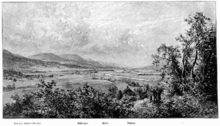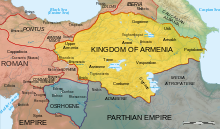Germanicus
During the reign of Augustus, Germanicus enjoyed an accelerated political career, entering the office of quaestor five years before the legal age in AD 7.[4] He took the agnomen (nickname) "Germanicus", awarded posthumously to his father in honor of his victories in Germania, at which point he nominally became head of the family in 9 BC.Because the Roman legions were not so effective at countering this tactic, Tiberius deployed his auxiliary forces and divided his army into small detachments, allowing them to cover more ground and conduct a war of attrition against the rebels in their strong defensive positions.The Romans also began to drive the rebels out of the countryside, offering amnesty to those tribes that would lay down their arms, and implemented a scorched earth policy in an effort to starve the enemy out.[15][16] The rebel position in Pannonia collapsed in AD 8 when one of their commanders, Bato the Breucian, surrendered their leader Pinnes to the Romans and laid down his arms in return for amnesty.Bato the Daesitiate withdrew from Pannonia to Dalmatia, where he occupied the mountains of Bosnia and began conducting counter-attacks, most likely against the indigenous people who sided with the Romans.[22][5] According to Cassius Dio, Germanicus was a popular quaestor because he acted as an advocate as much in capital jurisdiction cases before Augustus as he did before lesser judges in standard quaestiones (trials).He successfully defended, for example, a quaestor accused of murder in AD 10 in which the prosecutor, fearing the jurors would find in favor of the defense out of deference for Germanicus, demanded a trial before Augustus.[23] In AD 9, three Roman legions commanded by Varus were destroyed by a coalition of German tribes led by Arminius in the Battle of the Teutoburg Forest.The campaigns of Tiberius and Germanicus in Germania in the years AD 11–12, combined with an alliance with the Marcomannic federation of Marbod, prevented the German coalition from crossing the Rhine and invading Gaul and Italy.He also courted popularity by ministering the Ludi Martiales (games of Mars), as mentioned by Pliny the Elder in his Historia Naturalis, in which he released two hundred lions in the Circus Maximus.[27][28] On 23 October AD 12, Tiberius held a triumph for his victory over the Pannonians and Dalmatians, which he had postponed on account of the defeat of Varus at Teutoburg Forest.Unlike his adoptive brother Drusus, who received no recognition beyond being the son of a triumphator, Germanicus played a distinguished part in the celebration and was given the opportunity to display his consular insignia and triumphal ornaments.In Germany, the legions in mutiny were those of the Lower Rhine under Aulus Caecina (the V Alaudae, XXI Rapax, I Germanica, and XX Valeria Victrix).[31] The army of the Lower Rhine sought an increase in pay, the reduction of their service to 16 years (down from 20) to mitigate the hardship of their military tasks, and vengeance against the centurions for their cruelty.On the way back to their winter quarters at Castra Vetera, they pushed successfully through the opposing tribes (Bructeri, Tubantes, and Usipetes) between the Marsi and the Rhine.Germanicus coordinated a land and riverine offensive, with troops marching eastward across the Rhine, and sailing from the North Sea up the Ems River in order to attack the Bructeri and Cherusci.There, Germanicus and some of his men visited the site of the disastrous Battle of the Teutoburg Forest, and began burying the remains of the Roman soldiers that had been left in the open.At a location Tacitus calls the pontes longi ("long causeways"), in boggy lowlands somewhere near the Ems, Arminius's troops attacked the Romans.Arminius initially caught Germanicus's cavalry in a trap, inflicting minor casualties, but the Roman infantry reinforced the rout and checked them.[41][note 5] In preparations for his next campaign, Germanicus sent Publius Vitellius and Gaius Antius to collect taxes in Gaul, and instructed Silius, Anteius, and Caecina to build a fleet.Germanicus commanded eight legions with Gallic and Germanic auxiliary units overland across the Rhine, up the Ems and Weser rivers as part of his last major campaign against Arminius in AD 16.The Roman soldiers involved on the battlefield honored Tiberius as Imperator, and raised a pile of arms as a trophy with the names of the defeated tribes inscribed beneath them.The victorious Romans then raised a mound with the inscription: "The army of Tiberius Caesar, after thoroughly conquering the tribes between the Rhine and the Elbe, has dedicated this monument to Mars, Jupiter, and Augustus.[45] Then Germanicus ordered Gaius Silius to march against the Chatti with a mixed force of 3,000 cavalry and 33,000 infantry and lay waste to their territory, while he himself, with a larger army, invaded the Marsi for the third time and devastated their land.[59] According to Tacitus, this was an attempt to separate Germanicus from his familiar troops and weaken his influence, but the historian Richard Alston says Tiberius had little reason to undermine his heir.[64][65][66] Having settled these matters he traveled to Cyrrhus, a city in Syria between Antioch and the Euphrates, where he spent the rest of AD 18 in the winter quarters of the Legion X Fretensis.Tacitus reports that there were signs of black magic in Piso's house with hidden body-parts and Germanicus's name inscribed on lead tablets.Also suspected of connivance in his death was Tiberius's chief advisor, Sejanus, who would, in the 20s, create an atmosphere of fear in Roman noble and administrative circles by the use of treason trials and the role of delatores, or informers.Like Tacitus, he drew upon the imperial archives, as well as histories by Aufidius Bassus, Cluvius Rufus, Fabius Rusticus and Augustus' own letters.















Germanicus (disambiguation)Musée Saint-RaymondAntiochRoman SyriaMausoleum of AugustusAgrippina the ElderNero CaesarDrusus CaesarGaius Caesar (Caligula)Julia AgrippinaJulia DrusillaJulia LivillaDynastyJulio-ClaudianNero Claudius DrususTiberiusAntonia the YoungerGreat Illyrian RevoltBattle of IdistavisoBattle of the Angrivarian Wallancient RomanArminiusGermaniapatriciangens ClaudiaagnomenAugustusRoman emperorgens JuliaJulii CaesaresCaligulaClaudiusquaestorconsulproconsulGermania InferiorGermania SuperiorlegionsRoman armycampaignsRoman Empirein the Teutoburg Forestlegionary eaglestriumphAsia MinorCappadociaCommageneGnaeus Calpurnius PisoAlexander the GreatAureuspraenomenhis fatherhis paternal uncleIosif Constantin DrăganDies lustricusDecimusRoman naming conventionsAra PacisAntonia MinorLivillaTiberius Claudius NerotriumvirMark AntonyOctavia MinorJulio-Claudian dynastyGaius CaesarNero Julius CaesarAgrippina the YoungerIllyricumPannoniansDalmatiansSisciaMoesiaAulus Caecina SeverusSilvanuswar of attritionscorched earthMazaeiBato the BreucianPinnesBato the DaesitiateBosniaLepidusBurnumMontenegroSalonapraetorBattle of the Teutoburg ForestMarcomannic federationMarbodaedileGaius Fonteius CapitoPliny the ElderHistoria NaturalisCircus MaximusDrususRoman campaigns in Germania (12 BC – AD 16)commander of the forces at the RhineSenateprincepsimperiumGermanyAulus CaecinaV AlaudaeXXI RapaxI GermanicaXX Valeria VictrixGaius SiliusII AugustaXIII GeminaXVI GallicaXIV GeminadonativeCastra VeteraBructeriTubantesUsipetesSodales AugustalesDetmoldTacitusChattiMattiumGudensbergSegestesThusneldaImperator